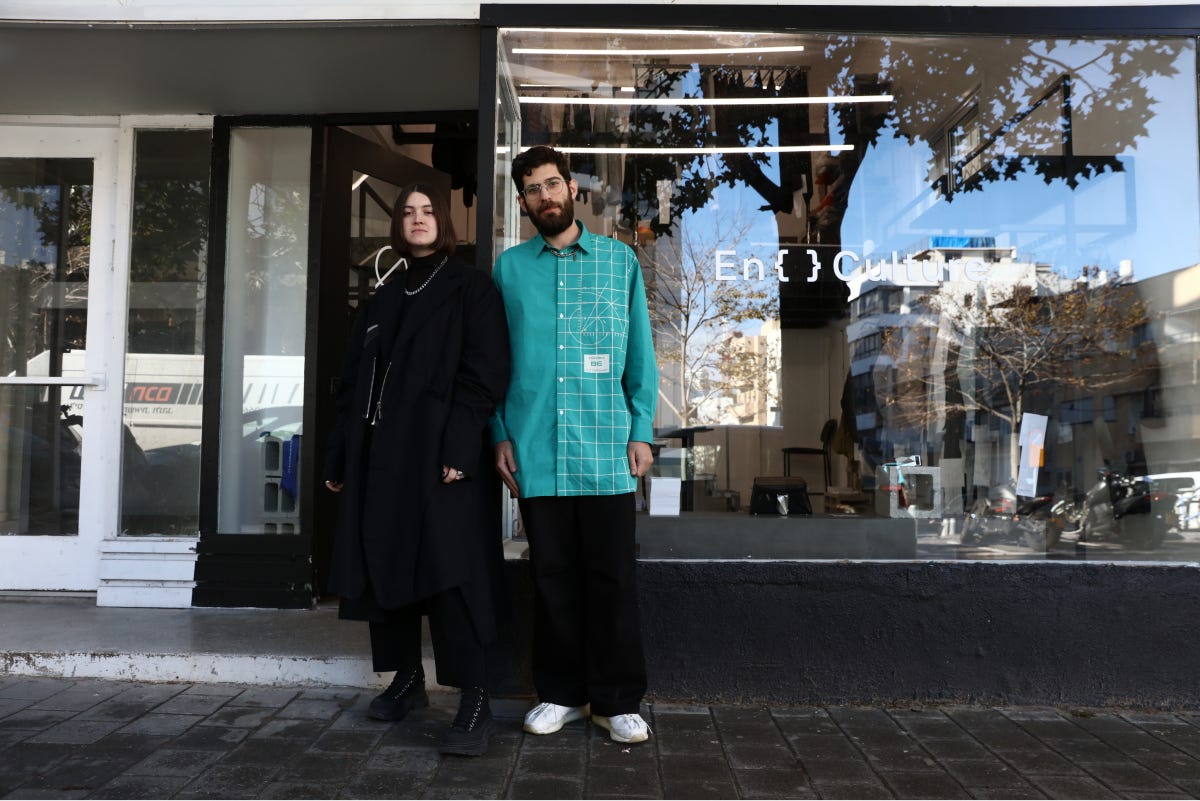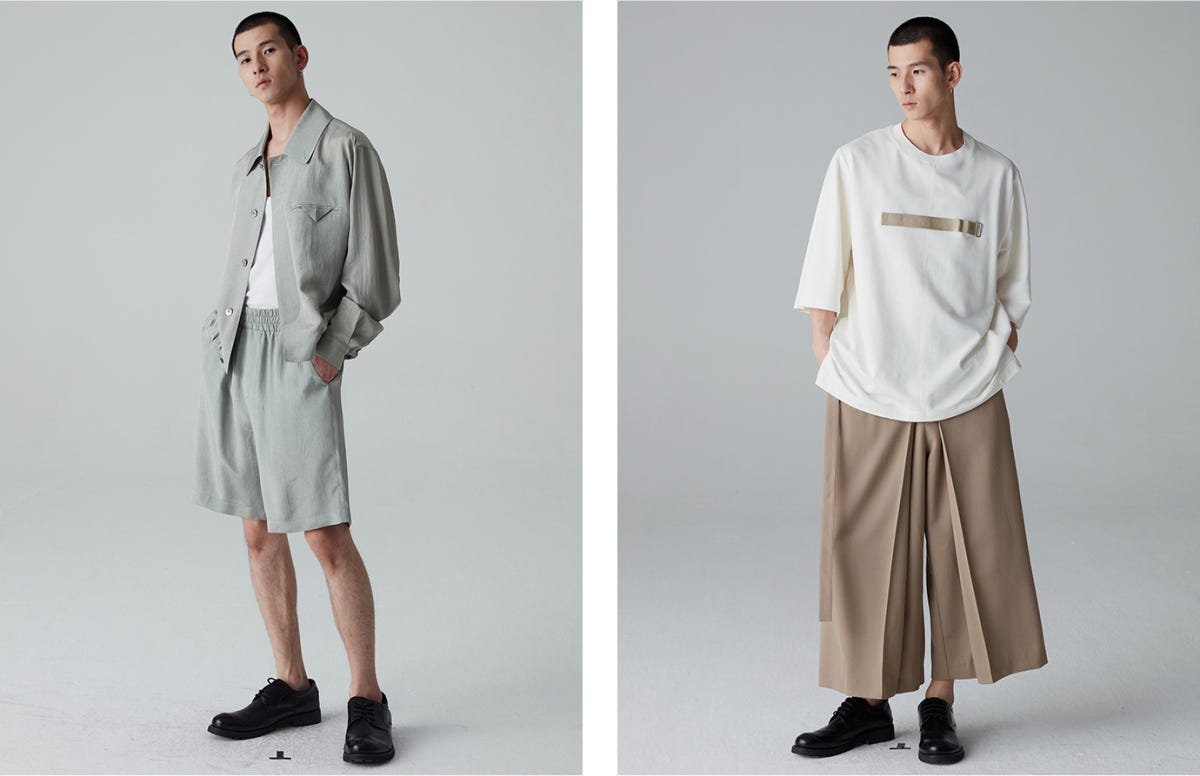En Culture: Not Just Another T-shirt
In Tel Aviv, a curated Asian streetwear store that comes with both the concept and the community
Tchernichovsky is one of the nicest streets in Tel Aviv. While it may be quiet and residential, it holds many secret spots to be discovered by a curious tourist: from the lovely boutique hotel, Saul, to the small Japanese cutlery and tableware store, Hattori. Lucky for me, I live just around the corner, so I had front-row seats when En Culture appeared one day, taking over a small boutique space – a single room, with a large window.
Almost all the clothes inside were black. Later, I would find out that Nica and Dan, En Culture co-founders, hardly wear any other colors. The majority of brands are premium streetwear labels from China (ROARINGWILD), while others are Japanese (HIPANDA), Korean (AJOBYAJO), or Israeli (not so long ago the store was “taken over” by a local brand All At Once).
But it wasn’t until I took a trip to Holon, a town close to Tel Aviv, that I encountered En Culture’s co-founders. I went to see an exhibition showcasing a dozen designers’ and artists’ reflections on and interpretations of a black garbage bag and, when a particular fashion garment and the Slavic last name under it caught my eye, I started to research – and thus discovered Nica Yakubov (she was showcasing her graduation collection from Shenkar College, where she studied fashion, at the exhibition in Holon). Together with Dan Pollak, a Reichman University graduate in computer science, they founded En Culture in 2021. They started from online sales and a small showroom in their own apartment, and, in January 2023, they opened a new boutique on Tchernikhovsky, 9.
How did you start the store?
N - We’ve always found it hard to find good clothes in Israel. Either it didn't fit, or they didn't have it in black, or they didn't have whatever I was looking for. Half a year before Covid, we went to Japan: and, while we were there, we found it very, very easy to shop. There were a lot of designers – local designers – and a lot of shops that sold interesting brands from all around Asia. It was very refreshing, and we bought a lot of stuff there. We came back – and then Covid began.
We were stuck at home, very bored, and we started to shop on Rakuten – we ordered soy sauce, yuzu, teriyaki, and stuff like that. Then, we started looking to see if they had the designers we had met in Japan, and dove deeper and deeper into the rabbit hole. We found out that a lot of designers were actually from China, South Korea, Indonesia, and Taiwan – from all over Asia, not just Japan. Japanese designers have this prominent reputation for good design and quality, but all around Asia, there are really interesting and fresh designers creating products of very high quality.
We decided to ask a friend who has a streetwear shop whether he would be interested in some of these brands because it's something new, it's fresh, it's never been seen in Israel before. He was kind of reluctant. He said that he had his own problems right now with Covid and everything. And I told Dan: “Okay, listen. He doesn't want it, so either you do it by yourself if you want it so much, or you have to let go”. And he said: “You know what? I'm going to do it by myself”.
And that's how we opened En Culture. We conducted a quality check on everything. We ordered samples as customers, not as a business – some clothing from each brand, and we tested it on ourselves. We wore it throughout the summer, exposing it to sunlight, sweat, and hot weather. Then we subjected the clothes to multiple washing cycles to see how the color holds, how the prints look after washing, and whether they shrink or maintain their quality. Afterward, we reached out to the brands we liked and began working with them as a business. Initially, we started with two brands, and, three months later, a third brand joined us. As we grew and our community expanded, our presence on Instagram and our website attracted more brands who wanted to collaborate with us.
Can you elaborate on what “good quality clothing” means for a Tel Avivian?
N - People who simply need clothes don't typically go to premium stores; they purchase them solely for the purpose of covering themselves. People who dress in premium streetwear want to express their preferences, culture, and the subculture of streetwear. When it comes to quality, they search for garments that are durable and don’t depend on trends. Tel Avivians who buy premium streetwear seek items that will last as long as possible, with colors that won't fade quickly. If the colors do fade, it should be intentional, like in the case of leather or natural dyes. They aren't necessarily searching for the highest quality or handcrafted products. Many of them engage in activities like skateboarding, so they want to be sure that the clothing won't tear or come apart at the seams.
D - Another aspect our customers look for is value for money, not just quality or style. They want a T-shirt that will endure over time, still make them feel good, and align with their preferred style and quality. They aren't interested in purchasing from fast-fashion brands like ASOS or Shein, where items often lack longevity. Occasionally, someone may say, "I bought something from ASOS or Shein, and it lasted five years." That's great, but what about the other hundred items they ordered? Did they last as long? Usually not.
How is En Culture's style perceived in Tel Aviv?
N - This is an interesting question that Dan and I often debate, because we started as a niche shop, but, as we grew, we realized that our appeal extended beyond the niche group interested in Asian or streetwear subcultures. For instance, we discovered that many women between the ages of 40 and 60 are highly interested in one of our brands, Maison Sans Titre. This brand focuses on soft tailoring and amazing suits. Initially, I thought it would mainly attract men looking for something interesting to wear to parties or weddings. But then I realized it could also appeal to women who desire a different style, with more tailored and gender-neutral elements, leaning towards a slightly masculine aesthetic. It's fantastic because, from the beginning, our intention was to create a community of individuals who value fashion and aesthetics. I love that the brand is growing and doesn't cater exclusively to one specific clientele. A mother, father, and child can all shop at the same place and still be unique and cool.
But running a store in Tel Aviv, you probably think: OK, it's summer. We need more t-shirts.
N - It's winter, we need more t-shirts. It's summer, we need more t-shirts.
D - A t-shirt is basically The Product, the base.
N - It has to do with the weather and the economy. It's easier to spontaneously buy a T-shirt than a jacket.
Another aspect we emphasize is offering small quantities. One of the worst things in fashion, in my opinion, is when a trend becomes popular, and suddenly everyone on the street is wearing the same Yeezy slides or whatever. It takes away the fun and uniqueness of that specific item or even an entire brand. We stock limited quantities to keep our customers entertained and offer them the exclusivity they seek. When someone sees another person on the street wearing one of our brands, they feel an instant connection.
Now, let's talk about the name. I know it's derived from "אין culture," which means "there's no culture." Why?
N - It started as a joke. During the COVID-19 pandemic, when we were trying to bring samples to Israel, we were thinking,
״אין פה כלום, אין פה מידות, אין פה ברנדים, אין פה קהילה, אין פה, אין פה, אין פה… אין כסף, אין זמן״
(There is nothing here, there are no sizes, there are no brands, there is no community, there is no, there is no, there is no... no money, no time...). Then we thought, "Okay, we can't just leave it like this; we need something bigger to add to it." So we brainstormed and thought, "How could we describe what we're trying to do, like אין?" That's when we came up with "אין תרבות" (En Culture).
Why do you communicate with your audience in English?
N - We wanted to reach out to everyone in Israel. There are many immigrants (olim) in Israel who communicate in English, as well as a lot of tourists. I believe that many olim are very interested in fashion, but they struggle to find decent places to shop because they don't understand Hebrew. They can't determine if a designer is cool, trendy, or available, or if a store is open or closed. They also have difficulty connecting with people because they don't understand the language. We wanted to be as neutral and approachable as possible for everyone. Personally, I find myself thinking in three languages. Sometimes the languages jumble in my mind, and I mix words in Hebrew, English, and Russian.
What can we expect for the next season?
D - We are both very excited to introduce new Chinese brands for the upcoming winter. Chinese designers and brands are gaining more recognition and a more positive reputation. Chinese designers, in general, are fighting the stigma of "made in China," and they're putting a lot of effort into showing that Chinese brands and designers can offer the same quality, innovation, and design as Western designers. Chinese designers are being featured on “Hypebeast100 Next”, and, in Paris Fashion Week, we see many asian designers, not just Chinese. Additionally, many Chinese designers have studied abroad in cities like London, Paris, or New York, where the competition is high, and only the best succeed. They have to be super cool, super innovative, and super interesting.
5 short questions for Nica and Dan:
– Where to eat in Tel Aviv?
– Hakatan. Yeah, definitely.
– What's your favorite secret spot in Tel Aviv?
– Guest Room.
– Favorite month in Tel Aviv?
– January or December, whenever it's cold.
– Your bestseller?
– T-shirts.
– Any advice that you would give yourself two years ago?
– Trust your gut.
All images courtesy of En Culture.








